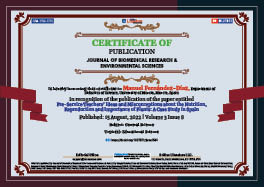Manuel Fernandez-Diaz*
Volume3-Issue8
Dates: Received: 2022-08-03 | Accepted: 2022-08-12 | Published: 2022-08-15
Pages: 930-933
Abstract
Science education encounters a number of obstacles to its progression. Among them are preconceptions or misconceptions, which can be persistent even among teachers. In order to find out what are these preconceptions o misconceptions about plants of future primary school teachers, the present research was carried out. A questionnaire was used during three academic years to collect information from pre-service teachers. Among the results, incomplete knowledge of plant biology and serious errors in relation to plant nutrition stand out. This seems to indicate the need to change traditional methodologies and use other active methodologies that allow future teachers to have real contact with the living beings in their environment.
FullText HTML
FullText PDF
DOI: 10.37871/jbres1534
Certificate of Publication

Copyright
© 2022 Fernández-DÃaz M. Distributed under Creative Commons CC-BY 4.0
How to cite this article
Fernandez-Diaz M. Pre-Service Teachers Ideas and Misconceptions about the Nutrition, Reproduction and Importance of Plants: A Case Study in Spain. J Biomed Res Environ Sci. 2022 Aug 15; 3(8): 930-933. doi: 10.37871/jbres1534, Article ID: JBRES1534, Available at: https://www.jelsciences.com/articles/jbres1534.pdf
Subject area(s)
References
- Charco J, Alcaraz FJ, Carrillo AF, Rivera D. Ãrboles y arbustos autóctonos de la Región de Murcia. Murcia: Centro de Investigaciones Ambientales del Mediterráneo. 2015.
- Prokop P, MajerÄÃková D, Vyoralová Z. The use of realia versus power point presentations on botany lessons. Journal of Baltic Science Education. 2016;15(1):18-27. doi: 10.33225/jbse/16.15.18.
- Buhner SH. The lost language of plants: The ecological importance of plant medicine to life on earth. Chelsea Green Publishing; 2002.
- Cañal P. Las concepciones de alumnos y alumnas sobre la nutrición de las plantas verdes. Investigación en la Escuela. 1991;13:97-113.
- Charrier M, Cañal P, Rodrigo M. Las concepciones de los estudiantes sobre la fotosÃntesis y la respiración: una revisión sobre la investigación didáctica en el campo de la enseñanza y el aprendizaje de la nutrición de las plantas. Enseñanza de las Ciencias. 2006;24(3):401-410.
- GarcÃa S, MartÃnez C, González C. Interés educativo que tienen para el profesorado determinadas ideas sobre reproducción. Revista Eureka sobre Enseñanza y Divulgación de las Ciencias. 2010;7(1):42-55.
- Calixto R, GarcÃa M. Concepciones alternativas de los profesores de biologÃa. Una aproximación desde la investigación educativa. Educación y Desarrollo Social. 2011;5(1):13-23.
- Gonzalez F. (coord.). Didáctica de las Ciencias para Educación Primaria. II - Ciencias de la vida. Pirámide. 2015.
- Urones C, Escobar B, Vacas JM. Las plantas en los libros de Conocimiento del Medio de 2º ciclo de primaria. Revista Eureka sobre Enseñanza y Divulgación de las Ciencias. 2013;10(3):328-352.
- Ahi B, Atasoy V, Balci S. An analysis of plant blindness in Turkish textbooks used at the basic education level. Journal of Baltic Science Education. 2018;17(2):277-287.
- Lappan G. A vision of learning to teach for the 21st century. School Science and Mathematics. 2000;100 (6):319-325.
- Yangin S, Sidekli S, Gokbulut Y. Prospective teachers´ misconceptions about classification of plants and changes in their misconceptions during pre-service education. Journal of Baltic Science Education. 2014;13(3):105-117. doi: 10.33225/jbse/14.13.105.
- Cuerva Moreno J. 9 Ideas clave para transformar la formación permanente del profesorado. Educación Abierta. 2016.